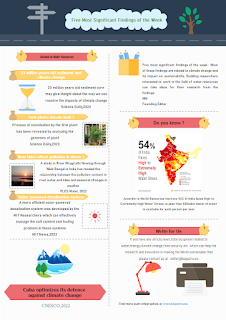"Sediment cores taken from the Southern Ocean dating back 23 million years are providing insight into how ancient methane escaping from the seafloor could have led to regional or global climate and environmental changes, according to a new study."
"Scientists analyzing one of the largest genomic datasets of plants have discovered how the first plants on Earth evolved the mechanisms used to control water and 'breathe' on land hundreds of millions of years ago. The study has important implications in understanding how to plant water transport systems have evolved and how these might adapt in the future in response to climate change."
"A new analysis of the River Ganges in West Bengal, India, highlights how wastewater flowing into the river impacts its water quality, and how that influences shifts with seasons and tides."
"MIT researchers have developed a solar-powered desalination system that is more efficient and less expensive than previous methods. In this schematic, a confined water layer above the floating thermal insulation enables simultaneous thermal localization and salt rejection."
"Cuba strengthens capacities for the management of its water resources in the face of climate change
Cuba, a small island developing country, faces the threat of climate change, based on its peculiar environmental characteristics. Its geographical location, configuration, and morphology make it highly vulnerable to climate phenomena capable of compromising the availability of freshwater which, as recalled by Tatiana Villegas, Specialist of Culture and Science Programs of UNESCO Regional Office for Culture in Latin America and the Caribbean:"
Thanking you,
Mrinmoy Majumder
Founding and Honorary Editor
Data HydroSubscribe
Publish your book with EIS Publishers
Promoted Products:
"Ashwagandha and Other Products for Enhancing Immunity".. Nutrilite(Use 13238584 as ABO ID)
Procure Hydrology Themed T-Shirts from Innovate S
Procure Hydrology Themed T-Shirts from Innovate S
